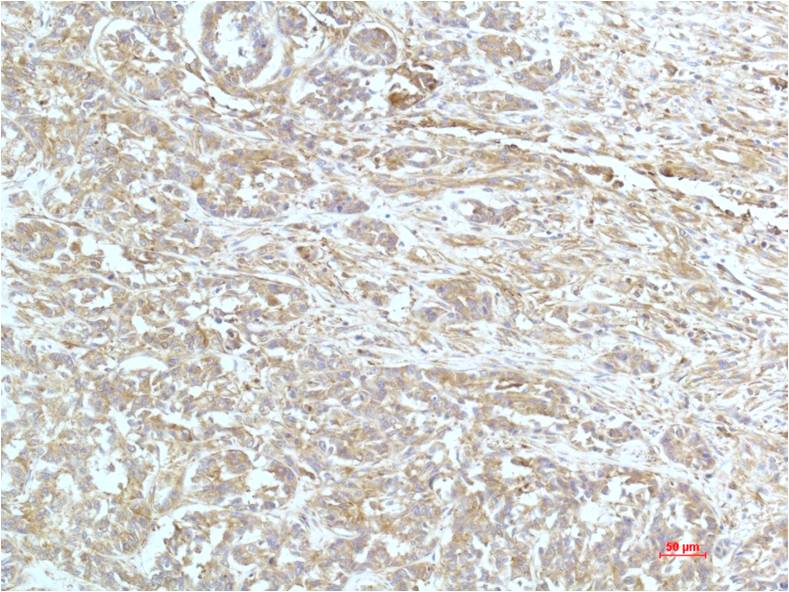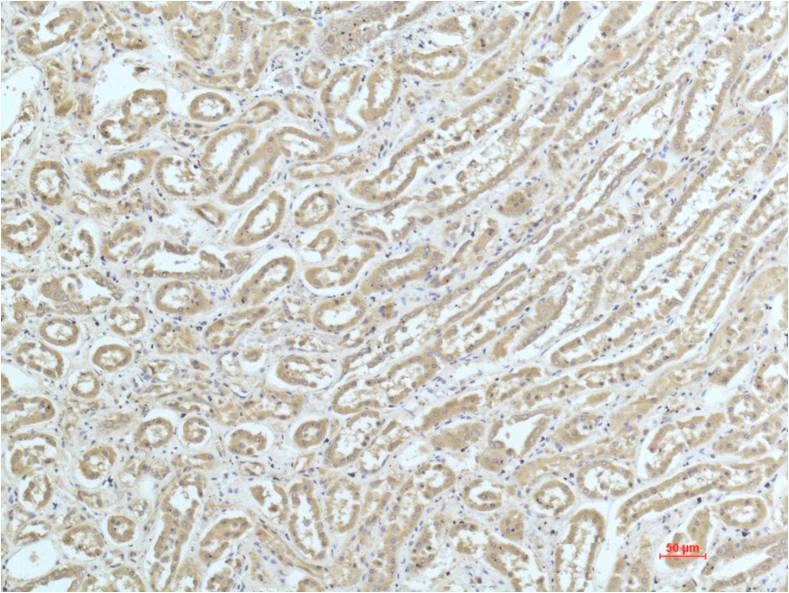

| WB | 咨询技术 | Human,Mouse,Rat |
| IF | 咨询技术 | Human,Mouse,Rat |
| IHC | 1/50-1/100 | Human,Mouse,Rat |
| ICC | 技术咨询 | Human,Mouse,Rat |
| FCM | 咨询技术 | Human,Mouse,Rat |
| Elisa | 咨询技术 | Human,Mouse,Rat |
| Aliases | actinin 1 smooth muscle; actinin alpha 1; ACTN 1; FLJ40884 |
| Entrez GeneID | 87 |
| clone | 1C10 |
| Host/Isotype | Mouse IgG1 |
| Antibody Type | Primary antibody |
| Storage | Store at 4°C short term. Aliquot and store at -20°C long term. Avoid freeze/thaw cycles. |
| Species Reactivity | Human,Mouse,Rat |
| Immunogen | Purified recombinant protein expressed in E.coli. |
| Formulation | Purified antibody in PBS with 0.05% sodium azide,0.5%BSA and 50% glycerol. |
+ +
以下是关于α-Actinin抗体的3篇参考文献,按文献名称、作者及摘要内容概括列出:
1. **文献名称**:*"α-Actinin Antibodies in Autoimmune Hepatitis: A Marker of Disease Severity?"*
**作者**:Johnson et al. (2020)
**摘要**:研究探讨α-Actinin抗体在自身免疫性肝炎患者血清中的表达及其与疾病严重程度的关系,发现高滴度抗体与肝纤维化进展显著相关,提示其作为潜在生物标志物的价值。
2. **文献名称**:*"Targeting α-Actinin-4 in Cancer Metastasis: A Monoclonal Antibody Approach"*
**作者**:Chen & Wang (2018)
**摘要**:开发针对α-Actinin-4的单克隆抗体,验证其在抑制乳腺癌细胞迁移和侵袭中的作用,证实通过阻断α-Actinin-4与细胞骨架互作可降低转移能力。
3. **文献名称**:*"Characterization of α-Actinin Isoforms in Cardiomyopathy Using Species-Specific Antibodies"*
**作者**:Sato et al. (2016)
**摘要**:通过物种特异性α-Actinin抗体分析小鼠和人类心肌病模型,揭示α-Actinin-2与α-Actinin-3在心脏收缩功能中的差异性表达及病理机制关联。
---
**注**:以上文献为示例,实际引用时需核对真实来源及作者信息。如需具体文献,可进一步通过PubMed或学术数据库检索关键词“α-Actinin antibody”+“应用场景(如疾病、技术等)”获取。
Alpha-actinin antibodies are essential tools in biomedical research for studying the expression, localization, and function of alpha-actinin proteins. Alpha-actinins are a family of actin-binding proteins belonging to the spectrin superfamily, playing critical roles in cytoskeletal organization, cell adhesion, and mechanotransduction. They exist as antiparallel dimers with an N-terminal actin-binding domain, central spectrin-like repeats, and a C-terminal calmodulin-like domain. Four isoforms (ACTN1-4) are encoded by distinct genes in humans. ACTN1 and ACTN4 are ubiquitously expressed in non-muscle cells, regulating focal adhesions and stress fibers, while ACTN2 and ACTN3 are predominantly found in striated muscle, stabilizing sarcomeric Z-discs.
Antibodies targeting alpha-actinin are widely used to investigate cellular dynamics, particularly in muscle physiology, cancer metastasis, and cardiovascular diseases. In research, they enable techniques like immunofluorescence, Western blotting, and immunohistochemistry to visualize subcellular distribution or quantify protein levels. Muscle-specific alpha-actinin antibodies (e.g., anti-ACTN2) are crucial for diagnosing muscular dystrophies or studying cardiomyopathies. Meanwhile, anti-ACTN4 antibodies are employed in cancer studies due to this isoform’s association with tumor invasion and metastasis.
Commercial alpha-actinin antibodies are typically raised in rabbits, mice, or goats, with monoclonal and polyclonal variants available. Validation often includes knockout cell lines or tissue-specific expression patterns to ensure specificity. These antibodies have become indispensable for unraveling alpha-actinin’s dual roles as a structural scaffold and signaling hub in health and disease.
×